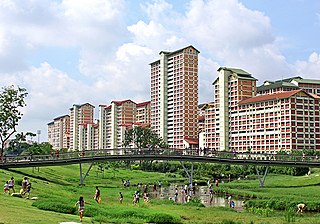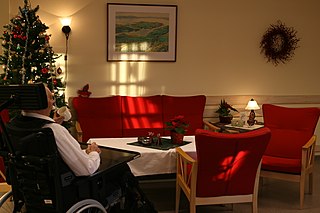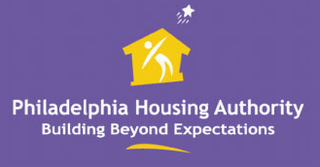
The United States Department of Housing and Urban Development (HUD) is one of the executive departments of the U.S. federal government. It administers federal housing and urban development laws. It is headed by the Secretary of Housing and Urban Development, who reports directly to the President of the United States and is a member of the president's Cabinet.

Public housing is a form of housing tenure in which the property is usually owned by a government authority, either central or local. Although the common goal of public housing is to provide affordable housing, the details, terminology, definitions of poverty, and other criteria for allocation vary within different contexts.
Section 8 of the Housing Act of 1937, often called Section 8, as repeatedly amended, authorizes the payment of rental housing assistance to private landlords on behalf of low-income households in the United States. 68% of total rental assistance in the United States goes to seniors, children, and those with disabilities. The U.S. Department of Housing and Urban Development manages Section 8 programs.

Elderly care, or simply eldercare, serves the needs of old adults. It encompasses assisted living, adult daycare, long-term care, nursing homes, hospice care, and home care.

The New York City Housing Authority (NYCHA) is a public development corporation which provides public housing in New York City, and is the largest public housing authority in North America. Created in 1934 as the first agency of its kind in the United States, it aims to provide decent, affordable housing for low- and moderate-income New Yorkers throughout the five boroughs of New York City. NYCHA also administers a citywide Section 8 Leased Housing Program in rental apartments. NYCHA developments include single and double family houses, apartment units, singular floors, and shared small building units, and commonly have large income disparities with their respective surrounding neighborhood or community. These developments, particularly those including large-scale apartment buildings, are often referred to in popular culture as "projects."
HOPE VI is a program of the United States Department of Housing and Urban Development. It is intended to revitalize the worst public housing projects in the United States into mixed-income developments. Its philosophy is largely based on New Urbanism and the concept of defensible space.
The Atlanta Housing Authority (AHA) is an agency that provides affordable housing for low-income families in Atlanta. Today, the AHA is the largest housing agency in Georgia and one of the largest in the United States, serving approximately 50,000 people.

The Philadelphia Housing Authority (PHA) is a municipal authority providing Public housing services in Philadelphia, Pennsylvania.

The Housing Act of 1937, formally the "United States Housing Act of 1937" and sometimes called the Wagner–Steagall Act, provided for subsidies to be paid from the United States federal government to local public housing agencies (LHAs) to improve living conditions for low-income families.

In the United States, subsidized housing is administered by federal, state and local agencies to provide subsidized rental assistance for low-income households. Public housing is priced much below the market rate, allowing people to live in more convenient locations rather than move away from the city in search of lower rents. In most federally-funded rental assistance programs, the tenants' monthly rent is set at 30% of their household income. Now increasingly provided in a variety of settings and formats, originally public housing in the U.S. consisted primarily of one or more concentrated blocks of low-rise and/or high-rise apartment buildings. These complexes are operated by state and local housing authorities which are authorized and funded by the United States Department of Housing and Urban Development (HUD). In 2020, there were 1 million public housing units. In 2022, about 5.2 million American households that received some form of federal rental assistance.
The Boston Housing Authority (BHA) is a public agency within the city of Boston, Massachusetts that provides subsidized public housing to low- and moderate-income families and individuals. The BHA is not a municipal agency, but a separate local entity.
Non-profit housing developers build affordable housing for individuals under-served by the private market. The non-profit housing sector is composed of community development corporations (CDC) and national and regional non-profit housing organizations whose mission is to provide for the needy, the elderly, working households, and others that the private housing market does not adequately serve. Of the total 4.6 million units in the social housing sector, non-profit developers have produced approximately 1.547 million units, or roughly one-third of the total stock. Since non-profit developers seldom have the financial resources or access to capital that for-profit entities do, they often use multiple layers of financing, usually from a variety of sources for both development and operation of these affordable housing units.
The Housing Authority of the City of Milwaukee (HACM) is a municipal agency of Milwaukee, Wisconsin dedicated to providing public housing and services for residents of the city of Milwaukee. The agency was established in 1944 and is responsible to a board of commissioners appointed by the mayor.

Howard County Housing is the umbrella organization for the Howard County Department of Housing and Community Development and the Howard County Housing Commission. The Department is Howard County Government’s housing agency, and the Commission is a public housing authority and non-profit. Both have boards that meet monthly.

The District of Columbia Housing Authority is an independent government agency whose mission is to provide affordable housing to extremely low- through moderate-income households, foster sustainable communities, and cultivate opportunities for residents to improve their lives throughout the eight wards of Washington, D.C.
Moving to Work (MTW) is a demonstration program for public housing authorities (PHAs) that provides them the opportunity to design and test innovative, locally designed strategies that use Federal dollars more efficiently, help residents find employment and become self-sufficient, and increase housing choices for low-income families. MTW gives PHAs exemptions from many existing public housing and voucher rules and more flexibility with how they use their Federal funds. PHAs can use special funding formulas for MTW agencies and permit agencies to shift funds between the programs or to other uses.

The Holyoke Housing Authority (HHA) is a public agency of the city of Holyoke, Massachusetts that provides subsidized public housing to low- and moderate-income families and individuals.
Houston Housing Authority (HHA), formerly Housing Authority of the City of Houston (HACH), is the public housing authority in Houston, Texas.
The Troy Housing Authority (THA) is a public agency of the city of Troy, New York that provides subsidized public housing to low- and moderate-income families and individuals, and is the pass-through agency for funding from various housing-related federal programs.

The John A. F. Hall Manor is a neighborhood of mixed-income housing in South Harrisburg, Pennsylvania. Managed by the Harrisburg Housing Authority, it was named after former mayor John A. F. Hall.











